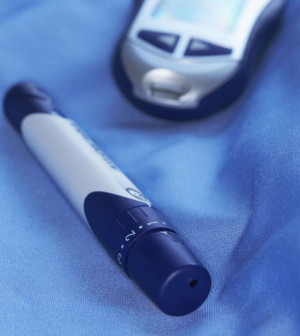- 10 Strategies to Overcome Insomnia
- Could Artificial Sweeteners Be Aging the Brain Faster?
- Techniques for Soothing Your Nervous System
- Does the Water in Your House Smell Funny? Here’s Why
- Can a Daily Dose of Apple Cider Vinegar Actually Aid Weight Loss?
- 6 Health Beverages That Can Actually Spike Your Blood Sugar
- Treatment Options for Social Anxiety Disorder
- Understanding the Connection Between Anxiety and Depression
- How Daily Prunes Can Influence Cholesterol and Inflammation
- When to Take B12 for Better Absorption and Energy
Insulin Pumps Give Kids With Type 1 Diabetes Better Blood Sugar Control

Insulin pumps help improve blood sugar control in children and teens with type 1 diabetes, researchers are reporting.
People with type 1 diabetes no longer produce enough insulin — a hormone necessary for the body and brain to use the carbohydrates in foods as fuel. Before insulin pumps, the only way to replace the lost insulin was through multiple daily injections of insulin.
Insulin pumps use a thin tube that’s inserted under the skin to deliver the missing insulin. Insulin pump sites — that’s where the tubing goes into the skin — typically have to be changed every three days, according to the American Diabetes Association (ADA). People with diabetes still have to tell the pump to deliver insulin, and how much insulin to deliver. They are not fully automated.
For the new study, researchers looked at three diabetes registries in the United States, Germany/Austria and England/Wales that included 55,000 children and teens with type 1 diabetes. The researchers — led in the United States by Dr. Jennifer Sherr, at Yale School of Medicine, in New Haven, Conn. — compared hemoglobin A1C levels among youngsters with type 1 diabetes who used either insulin pumps or insulin injections.
The hemoglobin A1C test provides a two- to three-month average of blood sugar levels. An A1C level of 7.5 percent or less is generally recommended for children and teens with type 1 diabetes, according to the ADA.
The study revealed that mean A1C levels were 8 percent for those using insulin pumps. For those using insulin injections, the study found a mean A1C level of 8.5 percent.
The researchers also found that only 22 percent of kids in ethnic minorities had pumps, compared with 34 percent of non-minority children. In addition, the study authors discovered that girls were more likely to have pumps than boys — 34 percent versus 30 percent.
The study was published in the Nov. 7 online edition of the journal Diabetologia.
Experts say that most children with type 1 diabetes qualify for insulin pump use. But there are wide variations in the availability and use of the devices, the researchers said.
The study authors called for further research into expanding the use of insulin pumps among young patients regardless of age, sex, ethnicity or country.
More information
The American Diabetes Association has more about insulin pumps.
Source: HealthDay
Copyright © 2026 HealthDay. All rights reserved.










